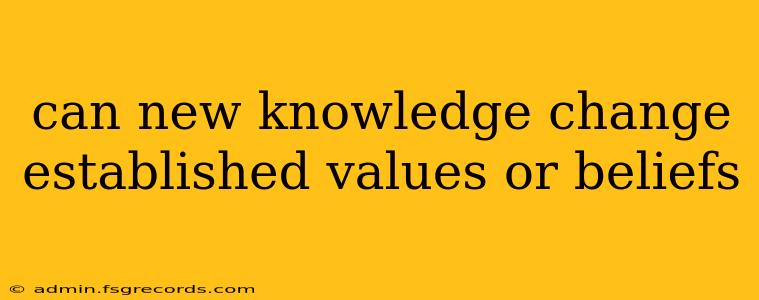Can New Knowledge Change Established Values or Beliefs? A Complex Interplay
The question of whether new knowledge can change established values and beliefs is a complex one, with the answer being a nuanced "yes, but it's not always simple or straightforward." While the acquisition of new information can lead to shifts in worldview, the process is rarely immediate or complete. Several factors influence the extent to which new knowledge impacts deeply held values and beliefs.
The Resistance to Change: Cognitive Dissonance and Confirmation Bias
Humans are inherently resistant to changing their deeply ingrained beliefs. This resistance stems from several psychological mechanisms:
-
Cognitive Dissonance: This theory suggests that when confronted with information contradicting existing beliefs, individuals experience mental discomfort. To alleviate this discomfort, they may either dismiss the new information, reinterpret it to fit their existing framework, or even strengthen their original beliefs.
-
Confirmation Bias: This bias refers to our tendency to seek out and favor information that confirms pre-existing beliefs while ignoring or downplaying information that contradicts them. This makes accepting contradictory new knowledge challenging.
-
Emotional Attachment: Many beliefs are intertwined with our identities, emotions, and sense of belonging. Challenging these beliefs can feel like a personal attack, leading to defensiveness and resistance.
Factors Influencing the Acceptance of New Knowledge:
Despite the inherent resistance to change, several factors can increase the likelihood that new knowledge will alter values and beliefs:
-
The Credibility of the Source: Information presented by trusted sources—experts, respected institutions, or individuals with personal relevance—is more likely to be accepted. Conversely, information from perceived unreliable sources is often dismissed outright.
-
The Strength of the Evidence: Overwhelming and irrefutable evidence is more likely to break through cognitive dissonance and confirmation bias. Anecdotal evidence or weak arguments are less persuasive.
-
The Presentation of the Information: The way information is presented significantly impacts its acceptance. A respectful, non-confrontational approach that acknowledges existing beliefs while gently presenting alternative perspectives is more effective than aggressive or condescending approaches.
-
Social Context and Peer Influence: The social environment plays a crucial role. If new knowledge is embraced by trusted peers or social groups, an individual is more likely to consider and accept it.
-
Personal Experience: Direct personal experience often carries more weight than abstract information. Witnessing firsthand events or encountering situations that directly contradict existing beliefs can be a powerful catalyst for change.
Examples of Knowledge Shifting Values:
Throughout history, new scientific discoveries and technological advancements have profoundly altered societal values and beliefs. Examples include:
-
The Heliocentric Model: The shift from a geocentric to a heliocentric model of the solar system challenged religious and philosophical beliefs about humanity's place in the universe.
-
Evolutionary Theory: Darwin's theory of evolution revolutionized our understanding of the natural world, challenging creationist narratives and prompting significant shifts in biological and theological thought.
-
Advances in Medicine: Medical breakthroughs like vaccination and antibiotics have radically changed our understanding of disease and mortality, impacting societal beliefs about health, hygiene, and public health measures.
Conclusion: A Gradual and Complex Process
In conclusion, while new knowledge can lead to changes in established values and beliefs, the process is rarely sudden or complete. It's a complex interplay of cognitive mechanisms, social influences, and the nature of the information itself. The credibility of the source, the strength of the evidence, and the way the information is presented are all crucial factors in determining its impact. Understanding these dynamics is crucial for effectively communicating new information and fostering constructive dialogue around potentially transformative ideas.

